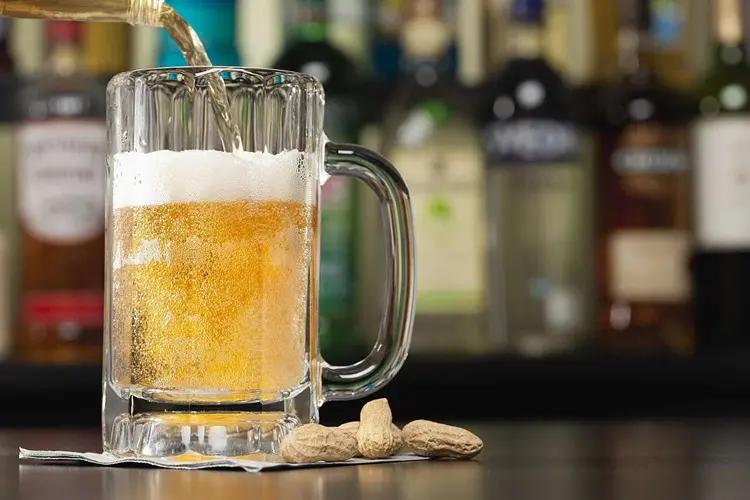According to explore the characteristics and impacts of other drinks, including beer. One common observation among beer drinkers is the tendency to sweat after drinking beer. Understanding the reasons behind this phenomenon requires a dive into the science of alcohol’s effects on the body, specifically focusing on beer and its unique properties.
The Physiological Mechanisms of Sweating
Sweating, or perspiration, is the body’s natural mechanism for regulating temperature and removing certain waste products. The process involves the release of sweat, primarily composed of water and salt, from sweat glands located throughout the skin. When the body’s internal temperature rises, the hypothalamus signals the sweat glands to produce sweat, which then evaporates, cooling the body down. Various factors can trigger sweating, including physical activity, emotional stress, spicy foods, and, importantly for our discussion, alcohol consumption.
Alcohol’s Impact on the Body
When alcohol is consumed, it quickly enters the bloodstream and affects various bodily functions. Several key mechanisms contribute to the increased sweating observed after drinking beer:
Vasodilation:
Alcohol causes vasodilation, which is the widening of blood vessels. This process increases blood flow to the skin’s surface, promoting heat loss through the skin. The warmth felt when consuming alcohol is a result of this increased blood flow. As the body works to dissipate the excess heat, the sweat glands are activated, leading to increased perspiration.
Central Nervous System Effects:
Alcohol affects the central nervous system, including the hypothalamus, which regulates body temperature. By interfering with the hypothalamus, alcohol can disrupt the body’s natural thermostat, causing an increase in body temperature and triggering the sweat response.
Metabolic Rate:
Alcohol consumption temporarily increases the metabolic rate as the body works to metabolize and eliminate it. This metabolic activity generates additional heat, prompting the body to cool itself through sweating.
Dehydration:
While alcohol is a diuretic and promotes water loss through increased urination, it can paradoxically lead to sweating. As the body becomes dehydrated, it may attempt to compensate by increasing sweat production to manage its temperature regulation more efficiently.
The Role of Beer
While all alcoholic beverages can induce sweating, beer has specific characteristics that can amplify this effect:
Volume of Consumption:
Beer is often consumed in larger quantities compared to other alcoholic beverages. A standard beer serving is typically 12 ounces, while a glass of wine is around 5 ounces. The larger volume of beer means more alcohol and more liquid intake, both of which contribute to increased sweating.
Alcohol Content:
Although beer generally has a lower alcohol content compared to wine or spirits, the cumulative effect of consuming several beers can lead to significant alcohol intake. This level of consumption exacerbates the physiological effects of alcohol, including sweating.
Temperature:
Beer is commonly consumed cold, which might initially cause a sensation of cooling. However, as the body processes the cold liquid and the alcohol, the internal temperature regulation mechanisms kick in, leading to sweating.
See Also: Why Do I Pee a Lot When I Drink Beer?
Practical Tips for Managing Sweating When Drinking Beer
Understanding why beer causes sweating can help in managing this effect. Here are some practical tips:
Stay Cool:
Consume beer in a cool environment to help regulate your body temperature. Avoid hot, crowded spaces where the ambient temperature can exacerbate sweating.
Pace Yourself:
Drinking beer slowly allows your body more time to process the alcohol and liquids, potentially reducing the intensity of sweating.
Stay Hydrated:
Drinking water alongside beer can help manage dehydration and regulate your body’s temperature more effectively. Aim to drink a glass of water for every beer consumed.
Choose Lighter Beers:
Opting for beers with lower alcohol content can lessen the overall impact on your body, including reducing the tendency to sweat excessively.
Dress Appropriately:
Wear lightweight, breathable clothing when drinking beer to facilitate better heat dissipation and reduce sweating.
Scientific Insights
Recent research provides deeper insights into the mechanisms behind alcohol-induced sweating. Studies suggest that individual variations in metabolism, body composition, and genetic factors can influence how the body responds to alcohol. For instance, people with faster alcohol metabolism rates may experience more pronounced thermogenic (heat-producing) effects, leading to increased sweating. Additionally, some individuals may have a genetic predisposition to sweating more when consuming alcohol due to differences in their sweat gland activity or vascular response.
Understanding Personal Tolerance
As with many physiological responses, individual tolerance to alcohol and its effects varies. Some people may be more prone to sweating when they drink beer due to their unique biological makeup. Factors such as age, gender, body weight, and overall health play a role in how the body processes alcohol and responds to its effects. Knowing your limits and understanding how your body reacts to different types and amounts of alcohol can help manage the side effects, including sweating.
Cultural and Social Considerations
The context in which beer is consumed can also influence the experience of sweating. Social settings, such as parties or bars, often involve higher ambient temperatures, crowded spaces, and physical activity, all of which can contribute to increased sweating. Additionally, the social nature of beer drinking can lead to faster consumption rates, amplifying the physiological effects. Being mindful of these factors can help mitigate the discomfort of sweating while enjoying beer in social settings.
Conclusion
The reasons are multifaceted, involving the physiological effects of alcohol on the body, the specific properties of beer, and individual differences in metabolism and tolerance. By understanding these factors, you can take steps to manage the sweating and enjoy your beer more comfortably. As a wine connoisseur, I appreciate the complexity of various beverages and the unique experiences they offer. Whether you are savoring a fine wine or enjoying a refreshing beer, knowledge and moderation are key to a pleasant and balanced experience.


